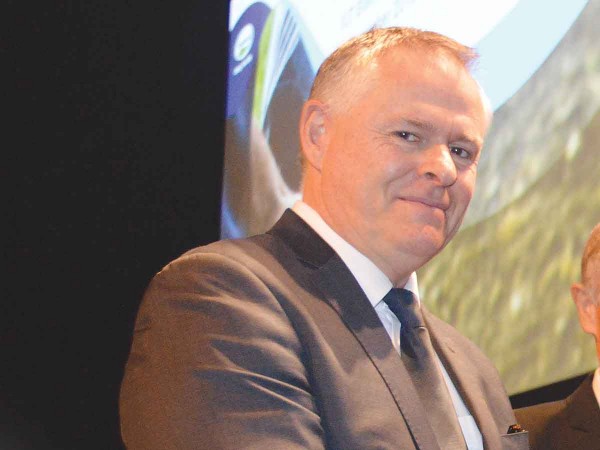
A sit-down with new Fonterra chairman Peter McBride, to suss out how he will steer New Zealand’s biggest company, suggests it may hold some truth.
Ask anyone about McBride and inevitably the first response is “he’s quiet”, followed closely by “impressive” and “Fonterra’s lucky to have him”.
That remains to be seen, but McBride’s style is indeed low-key, he appears to practise what he preaches about the need for some deep thinking, and that looks like good news for Fonterra’s culture, soured for its farmer-owners by poor strategy execution in recent years.
The new chairman – himself a dairy farmer and shareholder, as the co-op’s constitution dictates – had a meteoric rise up the director ranks of the world’s sixth-biggest dairy company by revenue, landing the job just two years after farmers overwhelmingly voted him in as a director.
Not that anyone’s surprised – McBride was tipped to become chairman the minute he became a director.
Why? The man himself couldn’t possibly comment, but admits to feeling the weight of 10,000 shareholders’ expectations.
But shareholders know why: “Look at Zespri.” “Because of Zespri – and there was no-one else.” “We’re grateful to have someone like him.” “He has a refreshing, clear approach and a quiet strength.”
McBride was chairman of grower-owned global kiwifruit marketer Zespri when the disease Psa ran amok in the country’s kiwifruit orchards from 2010, killing off the gold fruit variety, sending land values through the floor and breaking growers’ hearts as years of work and breeding had to be ripped from the ground.
With Zespri’s then-chief executive Lain Jager and the just-in-time emergence of new, more resistant gold variety SunGold, McBride is credited with steering the industry to recovery, and to the multibillion-dollar export success story it is today.
He’s also a successful businessman in his own right, and as chief executive of the large dairy and kiwifruit operation Trinity Lands, a Christian-based trusts entity with 2020 assets of $520 million, revenue of $66m and ebit of $26.5m. It distributes half its net annual surplus to its three foundation trusts which donate the money to community services.
During McBride’s time as a director, Fonterra has had a back-to-basics business strategy “reset” since the disastrous financial results of 2018 and 2019 – net losses of $196m and $605m respectively. The balance sheet is looking better.
But shareholders’ trust in their co-operative has been shaken by the destruction of $4 billion of their wealth by loss-making investments, mostly in China, a falling share price and a major cultural disconnect from the company they own.
Shareholders – and NZ Inc. – are looking to McBride, not just to further steady the ship, but to chart a profitable course.
The way he tells it, change is coming, though of the considered, gently-does-it variety.
While farmer-shareholders aren’t demanding a change in Fonterra’s capital structure, that’s very much on McBride’s mind as a member of a committee looking at the issue.
The last capital restructure was in 2012. Called Trading Among Farmers (Taf), it created a market for farmers to trade Fonterra shares and units in the Fonterra Shareholders’ Fund, which is open to farmers and the public. (Farm owners must buy shares in order to supply Fonterra, equivalent to their milk production. Only farmers can own actual Fonterra shares.)
McBride has been through capital structure change before, at Zespri. It was tough going, he recalls. And Taf was “very disruptive – these things take time to heal”. He voted for Taf “sort of reluctantly”.
“If we form a view we have to change it, it’s going to be really important how we go about that. Part of the thinking is … the nature of competition and the compulsory nature of our capital structure.
“I see it as a potential impediment to supply and a potential barrier to succession planning in the industry. It’s a significant amount of capital, so if you’re young right now it’s pretty difficult dealing with banks. They say yes, you can buy the family farm or a farm, but you can’t buy the shares. So you go supply someone else.
“The majority of us view land as a better investment than shares in a company so we will always lean towards the land. So we’ve got to deal with how to transition folks out of the co-op and into the co-op and how do we do that well?”
So is the day coming when co-op members won’t have to buy shares to supply milk?
“I’m not sure. We are considering all options.”
He predicts “managing the fund size may became an issue”.
“We’ve got to think deeply about that. We are looking 10 years ahead – what’s going to happen to New Zealand supply and competition [for milk]? One of our biggest issues is land use. We are seeing a lot of land going out of dairy and part of that is driven by the need to invest capital for compliance purposes.
“So we’re getting all these pressure points … we’ve got downward pressure on milk production from a number of fronts and for the first time in dairy industry history, we have to think we are not going to be growing volume.”
It’s not an issue about Fonterra’s future capital needs, McBride says. It’s about “thinking more deeply about creating value” from the milk Fonterra gets.
“I’m a great believer in respecting capital. In co-operative organisations, often we don’t respect capital. I’m thinking too about the delineation between remunerating the company and paying for the goods.
“I know when we did the Zespri review, it started with how Zespri was going to be remunerated – where and how Zespri took its margin. That was a three-year process, it was really corrosive and toxic.
“The issue for me was, they were trying to drag value from other areas – like selling fruit offshore and putting it back into the New Zealand fruit return, bundling value.
“You just can’t do that. It’s about understanding and respecting where value is created along the value chain and remunerating that part of the business.”
McBride says Fonterra is remunerated according to the Milk Price Manual, a “sacrosanct” process he is pretty comfortable with.
But he says Fonterra “spends an inordinate amount of time doing business with ourselves”. By that he means internal sales of milk and product between its businesses.
McBride calls himself “a change agent”.
“I challenge everything. I’m driven by trying to do things better. I’m a pretty straightforward person. They won’t be in any doubt about what I think.”
Shareholder trust will be rebuilt through communication, he says.
McBride agrees it was concern about the previous regime’s performance that prompted him to seek election as a director.
The “3 Vs” investment strategy of former chief executive Theo Spierings – dubbed “the $8 million a year man” – didn’t wash with McBride.
“Volume, value and velocity – volume is not a strategy, volume follows value and by virtue of the strategic construct, it compelled Fonterra to go more offshore. China was just an example and I felt quite strongly about it.”
We will see “a more conservative approach” from now on, he says.
“I’m a great believer in being brutally honest with ourselves and transparent.
“I’ve said it publicly before – we agreed to form Fonterra … and by virtue of the regulation we are then compelled to commit capital.
“That should have informed our thinking around risk appetite.
“It should have reflected that of our stakeholders, and should have been inherently much more conservative.”
Ouch. But it will be music to farmers’ ears. They need a champion right now. While heartened that their value to the economy in the pandemic is being recognised, and enjoying decent milk prices, they’re feeling the pressure of ever-increasing compliance costs and regulations, a bank lending squeeze and public and political disapproval of dairying practices.
“There’s a high expectation on me,” agrees McBride.
“I’m not overwhelmed by that, I’ll just get on and do my job. But it’s not about me, it’s about the team and me getting the best out of everyone. I like to empower people, to trust them.
“I don’t shy away from the tough conversations. I do it in a quiet way but I will confront issues.”
Former Zespri chief executive Lain Jager says McBride supported contributions from all Zespri directors. “He wasn’t a chairman who was at all dictatorial – he tended to empower the board.
“I would describe Peter as pretty classical. He liked a clear delineation between the role of the board and the role of executive, so he was looking for very good board papers written at an appropriate strategic level to empower the board to do their roles.
“My relationship with Peter was very professional because he was very professional.
“He’s not a guy with sticky fingers in the business,” says Jager.
Past Fonterra chairs have been criticised for doing just that, and for making the position a fulltime job.
That won’t be McBride’s style. “I’m not running this company,” he says. “I’ve got rid of the chairman’s apartment in Auckland – I don’t need it. That’s quite symbolic I think.
“The most demotivating thing for a CEO is not to feel trusted. I get that stuff – and with the board I’ll be trying to share responsibilities and help develop skills.”
Fonterra has four independent, non-farmer directors and seven elected by shareholders.
McBride says when it comes to the independents, he’ll be looking for capability first, but empathy with farmers is up there too.
“We don’t have room for arrogance. We need to be empathetic. I have some standards and expectations around that.
“Zespri and Fonterra are regulated constructs so humility is really important. We have to do a lot of time listening to people, not talking down to them. I’m quite hot on listening.”
McBride wants management to also be given time and space to interact with shareholders.
“We are a work in progress on that [interaction]. We do our results farmer meetings which are fine, but they’re always looking back.
“We need to spend some time looking back but most of the time looking forward. We need to bring the market to farmers because Fonterra sits between the producer and the consumer.
“We are trying to lead change around sustainability and animal welfare and a whole lot of other stuff so we need to convey that message well. Bringing consumer and customer insights to our farmers is really important. I want to change things up a bit in that regard.”
On the continuing debate about whether Fonterra – formed from a 2001 industry mega-merger enabled by special legislation on the promise it would be a national economic champion – should be churning out more high value consumer products or sticking tocommodity ingredients exports, McBride has a new angle.
“Fonterra can do both but I think on the consumer product side, we should do it well or not do it at all. I have absolute confidence in our ingredients and food service businesses.
“Personally, I’m inclined to invest in research and development and monetising that. In an organisation like this, resetting it is one thing, creating wealth off the back of that new balance sheet is a whole different challenge.
“I think we are underspending on R&D. We’ve given away our IP [intellectual property].There is a lot of value to be had from royalties for ingredients and applications. I’m quite focused on that.”
The IP giveaways have been to customers who have gone on to monetise it, he says.
“Historically we’ve taken the capital-intensive farmer approach. We are starting to think about how do you create value if you didn’t have the capital?
“How do you partner with people, how do you develop IP and create wealth that way? In the past it’s always been about capital.
“Zespri didn’t have any capital for a long time and look at where it is now – it’s all about IP.”
PETER McBRIDE
• Home: Tauranga
• Age: 56
• Family: Married with four children
• Last book read: “Board papers”
• Enjoys: Fishing, golf, all watersports, rugby
• Drives: A Ford Ranger and an Audi SQ5






















